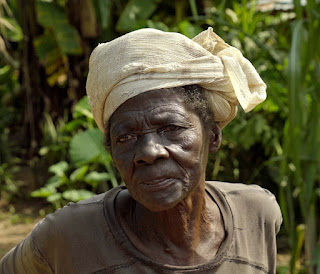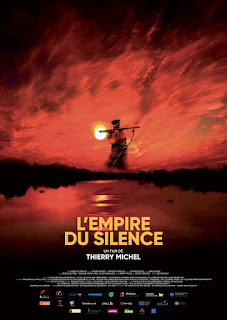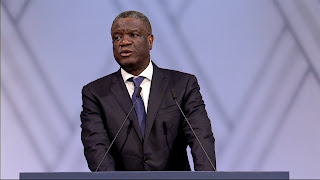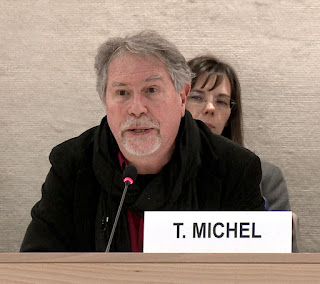By Dimitri Keramitas
Few titles are
as painfully ironic as that of Thierry Michel’s excellent but wrenching
documentary Empire of Silence, about the long wars in the Democratic
Republic of the Congo - a country that human rights observers don’t consider to
be “democratic”, and which doesn’t perhaps qualify as a “republic”.
Yet, as the
Belgian director’s lush footage makes clear, this vast land in central Africa
could be something akin to paradise. The rolling, forested hills and valleys,
the nestling villages, evoke endless fecundity, while the enormous Congo River provides
a lifeline to much of the country.
When the Nobel Laureate
Denis Mukwege, a doctor and human rights activist, says in the film that Congo is the “world’s wealthiest nation”, he
inadvertently steps towards the slippery slope. For it is the monetization of “paradise”
(turning it into an “empire”) that is at the root of a long history of
unspeakable brutality. In the past it was minerals such as gold, nickel,
copper, then “blood diamonds”, still a lucrative business. Now high tech - smartphones,
electric cars, batteries - have made the country an important source of cobalt
and rare earths.
Michel isn’t
interested in presenting us with an artsy impressionistic documentary. Although
the film is extraordinarily vivid, he’s an old-fashioned documentary filmmaker
who wants to teach his public. He uses old news footage (including recyclings
of his own work), superimposed maps of different regions, talking-head
interviews and his own intoning voiceover taking us through the country’s
history.
Mobutu, finally
old and ailing, was overthrown by an unlikely rebel leader named Laurent Kabila.
The footage the director shows of Kabila, interviews and his swearing-in
ceremony (conducted in French), depicts a bald, round-faced, heavy-set man,
with an ingratiating smile.
A long-time
opponent of Mobutu as far back as the 1960s, the famed revolutionary Che
Guevara, during his Congolese adventure, noted Kabila’s fecklessness. How could
such a man force his way to power? For Michel, essentially two reasons: Rwanda
and Uganda. Both countries wanted to pillage Congo as much as Western robber-imperialists
- Rwanda eventually became one of the world’s largest exporters of (Congolese)
diamonds.
When the
Congolese people got sick of the foreign intrusions, Kabila ordered out Rwandan
troops, including an officer who was a high official in the Congolese
army. Soon afterwards the president was
assassinated by his own bodyguard. More grotesque ironies, with evil emerging
from the good: Rwandan leader Paul Kagame, who overthrew the genocidaires in
his nation, and became the West’s example of African modernization, is the
chief villain of the documentary. He pursued not just renegade Hutu killers in
Congo borderlands, but also refugees, perhaps because they might one day
support and join the extremists. Many were abducted and forced back to Rwanda,
many were slaughtered. Yoweri Museveni of Uganda, who’d defeated the mass
murderers Idi Amin and Milton Obote, was another “development” icon, but he
wound up as Kagame’s partner in crimes against humanity.
The successor
to Kabila was his son, Joseph Kabila, who ruled for a number of years, during
which time Rwandan and Ugandan influence prevailed once again, and violence
continued to be the order of the day. Michel puts together a sort of montage of
Joseph Kabila that is fascinating to watch, in a very disturbing way.
We see his
swearing-in ceremony, which is an eerie repeat of his father’s, and also glimpses
of him as president at various times. But the most intriguing footage is one of
him before his father came to power, when he too was a rebel in uniform. This
contradicts the idea of Joseph Kabila as just an entitled fils à papa. We can’t
help wondering if he may even have been complicit in his own father’s death,
though no evidence has emerged, only the fact of Kabila blithely dealing with
the regimes that certainly wanted the father dead
The chilling
nadir, and taunting riposte to humanitarian efforts, comes with Michel’s
recounting of the murder of two UN human rights investigators, an American man
and Swedish-Chilean woman. Michael Sharp and Zaida Catalan were investigating
crimes against humanity committed by warlords and got too close to a node of
power. Phone video shows armed men leading them away from the road where they were
accosted. We then see first Sharp, followed by Catalan, shot to death.
The director
has accomplished a great deal by depicting in vivid texture and comprehensible
form the complexity of Congo’s tragedy. But as the story continues into the
contemporary moment, we would like him to name some names of the present-day
corporate and political criminals responsible for the ongoing situation, and
also to examine the legacy of Belgian colonialism, even if he might have
already done so in other films.
Michel tries to
end on an uplifting note by showing us some sort of tribunal proceeding. It’s
not clear where this is taking place, or under whose auspices. Who are the
juridical-looking persons presiding, and what are the supposed results supposed
to be? We see victims testifying, and villagers chanting in unison about past
crimes. The first at least seem authentic; the latter have obviously been
rehearsed. Was this a pantomime put on by the Congolese regime, or a “truth and
reconciliation” event sponsored by an NGO? The lack of clarity is frustrating,
and not very convincing.
Yet Thierry
Michel is, on the whole, to be applauded for making this film, as well as his
documentary on Dr. Mukegwe (L’Homme
qui répare les femmes / The Man Who Repairs Women) and several other films about Congo - they
should be required viewing for any number of officials and activists, even if
another irony is that a Belgian filmmaker is producing such documentaries. –
SWAN
All photos courtesy of JHR Films (distribution). Empire of Silence will be in cinemas from March 16.
Dimitri
Keramitas is a writer and legal expert based in Paris.



